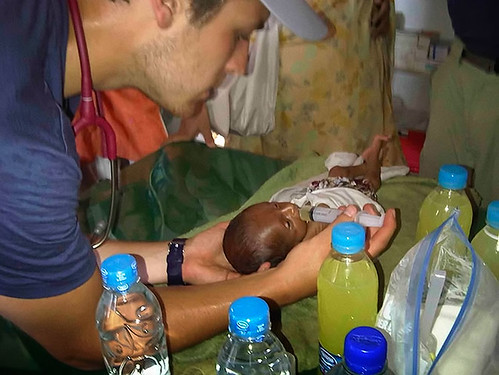The oppressive summer heat envelops Glenn Volk ’09 as he squats on the crude concrete floor at a clinic in the Punjab region of Pakistan. Beside him, a mother cradles her lifeless-looking baby, who seems to have barely any strength left to make it through the night, in her arms. Volk quickly diagnoses the child as severely dehydrated, and administers an oral rehydration solution. Within minutes, the baby begins to cry and show signs of life.
“To be honest, words can’t express it,” Volk said. “It was a very humbling experience; it makes you feel very grateful and very lucky to be born in America.”
Volk, as part of the medical staff of Dr. Eduardo Dolhun and his Doctor’s Outreach Clinic, recently spent 10 days working with Team Rubicon, a humanitarian effort to aid Pakistanis who lost their homes, livelihoods, and health in the major flooding that began there in late July.
But Volk hasn’t been in the medical field for long. After graduation from Colgate, the former captain of the ’08 Raiders soccer team had embarked on a promising professional soccer career. He spent a year in Puerto Rico and then started for the Louisville Lightning last season as a midfielder.
Then he switched gears, choosing medicine over soccer when — instead of renewing his contract for 2010 — he accepted a position with Dolhun, a family practice physician in San Francisco who offers a pre-medical internship for post-baccalaureate students planning to attend medical school.
“It was an uphill struggle to play soccer,” Volk explained. “I still love the sport and I love to play, but medicine has always been on the backburner for me. It’s great to have the ability to help everyone.”
In Pakistan, Volk worked alongside Dolhun and Team Rubicon’s paramedic to treat victims of the flooding, administering a rehydration solution called Drip Drop that Dolhun himself, an expert in cholera, developed.
The group saw up to 1,000 patients a day, which made it a “challenge just seeing everybody,” Volk said. “We went to places where no medical aid could go. We sometimes had to hike to patients, and it was hard having to leave even though there were more patients to still see.”
Often the team had to change clinic locations in the middle of the day because of security concerns, as many places suffered, in addition to the weather, from suicide bombings.
When his parents sent a picture of Volk at work in Pakistan to his former Colgate geography professor Ellen Kraly, she was brought to tears.
“I miss Glenn every day here in the geography department,” she said of Volk, who had taken her Medical Geography and Disease Ecology course, describing him as “so engaged … the very best listener, and very kind.”
Now back in the States, Volk is finishing his medical school prerequisites at the University of San Francisco and plans to take the MCAT next year.
“I still have some time before that, though,” he said, “so hopefully I can travel some more and help out wherever I’m needed.”
